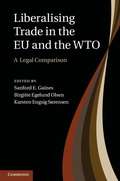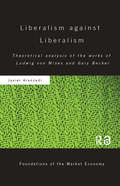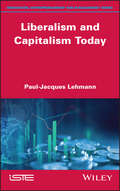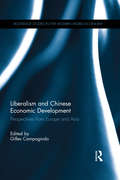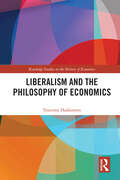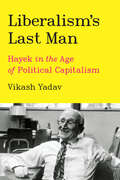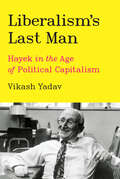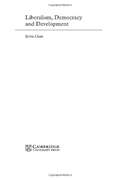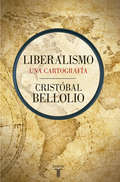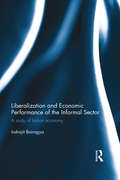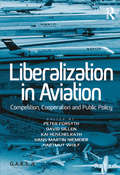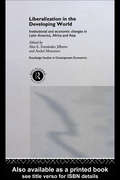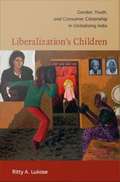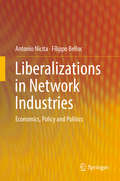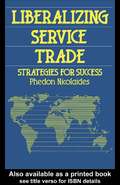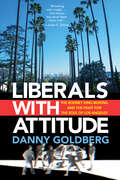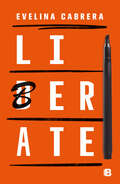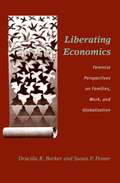- Table View
- List View
Liberalising Trade in the Eu and the Wto
by Sanford E. Gaines Birgitte Egelund Olsen Karsten Engsig SørensenThis comparison of EU and WTO approaches to common trade-liberalisation challenges brings together eighteen authors from Europe and America. Together they explore fundamental legal issues, such as the role of general principles of law, the role of the judiciary in the development of law, the effect of the principle of non-discrimination and the elimination of non-discriminatory barriers to trade. The contributions also examine the most recent developments in trade law across a full range of trade issues, including TBT and SPS, services, intellectual property, customs rules, safeguards, anti-dumping and government procurement. Adopting a comparative perspective throughout, this volume sheds light on today's trade law and suggests paths forward for each system through the perennial tensions between open, non-discriminatory trade and strongly held national values and objectives.
Liberalism against Liberalism: Theoretical Analysis of the Works of Ludwig von Mises and Gary Becker (Routledge Foundations of the Market Economy)
by Javier AranzadiThe defence of the market and economic freedom have been the main objectives of the investigations by liberal thinkers such as Milton Friedman, Gary Becker, F Hayek and L Von Mises. Bearing in mind that the first two economists are the maximum exponents of the Chicago School and the last two of the Austrian School, it is often concluded that the theories of both schools are similar. This book demonstrates that in reality, there is no convergence or complementariness to be found between both schools of thought. The anthropological categories, contributed by Mises, allow us to understand all human phenomena from the view of the man who acts. In this view, economics is part of a philosophical system whose core is the creative capacity of people. Becker’s work, on the other hand, is concentrated on the generalization of the homo economicus as the basis for explaining all human behaviour. He generalizes the maximizing principle to explain all human reality, and extends the scope of the application of a so-called scientific and technical view of the world. In this key volume, an important read for those in the fields of economic theory and political economy, Javier Aranzadi argues, in essence, that the tradition of Hayek and Mises encourages a humanistic liberalism, whereas the Chicago School proposes only a technical humanism.
Liberalism and Capitalism Today
by Paul-Jacques LehmannIt now seems to be a given that the principles that presided over the birth of liberalism and capitalism are no longer relevant. To understand the evolution of this ideology and economic system, Liberalism and Capitalism Today examines the work of the two authors who have contributed the most to the analysis of the conditions that lead to the emergence of these types of organization: Alexis de Tocqueville of France and Max Weber of Germany.This book thus analyzes how the evolution of the general environment of a civilization leads to the emergence of new ways of approaching economic life, and then to its development, thanks to innovations in many fields.This historical perspective makes it possible to understand the transformations that liberalism and capitalism could offer. It suggests a potential path that does not involve simply returning to a way of life that has been totally altered by the evolution of civilizations and the economy, but instead leads to a more peaceful way of living in most countries of the world.
Liberalism and Chinese Economic Development: Perspectives from Europe and Asia (Routledge Studies in the Modern World Economy)
by Gilles CampagnoloLiberalism and Chinese Economic Development brings international contributors together in order to consider economic, political, social and legislative aspects of China’s modernization. This volume explores how liberalism is received and perceived, and whether it is adapted or adopted upon the basis of centuries of Chinese civilization and decades of capitalism. China’s role in the global economy is an undeniable force. This book examines both historical and contemporary dimensions surrounding the question of Chinese liberalism, exploring China’s economic development in a comparative context. In particular, this text explores differences with the Western model, and more specifically, the relationship between Chinese economic thought and European traditions. This text assesses China’s economic development at both a macro and a micro level, and also considers its relationship with its neighbours. Campagnolo answers whether free-trade and capitalistic economic developments are long sustainable without other types of liberal developments? Or is the idea that political liberties and economic freedom are just Western ideologies? This is a uniquely wide ranging book, suitable for scholars of the Chinese economy, the history of economic thought, economic philosophy and international political economy.
Liberalism and Socialism: Mortal Enemies or Embittered Kin? (Palgrave Studies in Classical Liberalism)
by Matthew McManusIn times of pandemic and global economic crisis, little more than a decade after the last, there are serious questions about how the liberal order can stand, who its friends are, and what the future will look like. This edited collection provides a comprehensive overview of the principles and stakes at play in the dispute between liberalism and socialism. It explores the 21st century appeal of socialism, particularly to millennials and other relatively young citizens, and shows why modern classical liberalism and neoliberalism have generated tepid support, leading to the resurgence of socialism after it was thought dead and buried due to the dramatic failures of statist models in 1989. The authors put modern socialism and liberalism into renewed dialogue with another to examine whether the two can coexist peacefully, or even reach an overlapping consensus on social reform going forward. It delves into the history and theory of both liberalism and socialism to determine points of overlap and tension, in addition to a cross-disciplinary interpretive analysis of the present epoch to determine how both traditions have evolved since the 20th century. The book is interdisciplinary and provides a broad array of perspectives including a diversity of ideological perspectives ranging from committed Marxists to libertarians. It will be of interest to academics and students in economics and contemporary political culture.
Liberalism and the Philosophy of Economics (Routledge Studies in the History of Economics)
by Tsutomu HashimotoDrawing on recent work in the contemporary philosophy of economics, this book presents new ideas on liberalism, including the concept of ‘growth-oriented liberalism’. Since the end of the Cold War, questions and definitions of liberalism have moved from the sphere of political systems (the socialism versus liberalism debates) to the sphere of ethics (what it means to live in a liberal society). The chapters in this work trace the trajectory of the concept of liberalism in the philosophy of economics by exploring the ideological implications of the methodological debate between socialism and liberalism, the idea of liberty as real freedom, the ethical implications of Max Weber’s methodology on autonomy and liberty, and new typological theories of ideologies in the context of contemporary economic ethics. This book marks a significant contribution to the literature on liberalism in the philosophy of economics and economic methodology, and is highly recommended for readers who seek updated ideas on liberal society in its ethical and philosophical contexts.
Liberalism's Last Man: Hayek in the Age of Political Capitalism
by Vikash YadavA modern reframing of Friedrich Hayek’s most famous work for the 21st century. Friedrich Hayek’s The Road to Serfdom was both an intellectual milestone and a source of political division, spurring fiery debates around capitalism and its discontents. In the ensuing discord, Hayek’s true message was lost: liberalism is a thing to be protected above all else, and its alternatives are perilous. In Liberalism’s Last Man, Vikash Yadav revives the core of Hayek’s famed work to map today’s primary political anxiety: the tenuous state of liberal meritocratic capitalism—particularly in North America, Europe, and Asia—in the face of strengthening political-capitalist powers like China, Vietnam, and Singapore. As open societies struggle to match the economic productivity of authoritarian-capitalist economies, the promises of a meritocracy fade; Yadav channels Hayek to articulate how liberalism’s moral backbone is its greatest defense against repressive social structures.
Liberalism's Last Man: Hayek in the Age of Political Capitalism
by Vikash YadavA modern reframing of Friedrich Hayek’s most famous work for the 21st century.Friedrich Hayek’s The Road to Serfdom was both an intellectual milestone and a source of political division, spurring fiery debates around capitalism and its discontents. In the ensuing discord, Hayek’s true message was lost: liberalism is a thing to be protected above all else, and its alternatives are perilous.In Liberalism’s Last Man, Vikash Yadav revives the core of Hayek’s famed work to map today’s primary political anxiety: the tenuous state of liberal meritocratic capitalism—particularly in North America, Europe, and Asia—in the face of strengthening political-capitalist powers like China, Vietnam, and Singapore. As open societies struggle to match the economic productivity of authoritarian-capitalist economies, the promises of a meritocracy fade; Yadav channels Hayek to articulate how liberalism’s moral backbone is its greatest defense against repressive social structures.
Liberalism, Democracy and Development
by Sylvia ChanMany commentators have assumed a close connection between liberal democracy and economic development. Sylvia Chan questions this assumption and suggests a new theoretical framework, in which liberal democracy is 'decomposed' into economic, civil and political dimensions that can be combined in different ways, allowing for a range of 'institutional matrices'. She then shows, in a case study of Japan and the Asian newly industrialising countries, how these seemingly less democratic countries have enjoyed a unique mix of economic, civil and political liberties which have encouraged economic development, without the need to share the institutional structures and cultural values of the West. Chan's model therefore provides a re-evaluation of the institutional capacities needed to sustain a competitive economy in a globalising world, and develops a more sophisticated understanding of the democracy-development connection.
Liberalismo: Una cartografía
by Cristobal BellolioUn mapa que ilustra las múltiples modalidades de esta corriente política e intelectual Lo que hacen estas páginas es recorrer distintos debates donde la gran familia liberal se tensiona en torno a principios o valores que no se reducen (necesariamente) a la distribución final de los recursos materiales. A partir de estas tensiones, se trazan otras tantas distinciones al interior del liberalismo. El autor propone, por tanto, siete formas de cartografiar —de ahí el título del libro— la filosofía política liberal.
Liberalization and Economic Performance of the Informal Sector: A study of Indian Economy
by Indrajit BairagyaImpact of liberalization on informality has been a subject of intense debate for many years and the major issue that has come up is whether liberalization helps to grow informal sector and informality in the economy or it is an obstruction for informal sector’s growth. Thus, in the light of the recent liberalization measure, this book sets to examine general presumptions of the development of informal sector in the context of the Indian economy. The book begins with a broad framework for analysis of output contribution and growth of the informal sector. Liberalization is measured by openness indices and inter-sectoral linkages. Impact of liberalization on growth contributions of informal sector is captured by openness indices (i.e. degree of openness to trade and principal component scores), technical efficiency (measured by Data Envelope Analysis and estimated by Tobit Censored Regression model) and components of productivity (computed by Malmquist total factor productivity index) of the informal enterprises by inter-sectoral linkages. The linkages are modeled theoretically in a neo-classical growth theory and empirically measured by sub-contracting arrangements between formal and informal enterprises. In addition, the book also provides implications on promotion of informal sector from the viewpoint of employment generation. The description and analyses of the book will help with policy implications and enlighten the readers on the development of informal sector.
Liberalization in Aviation: Competition, Cooperation and Public Policy
by Peter Forsyth Kai Hüschelrath David Gillen Hans-Martin Niemeier Hartmut WolfThe last few decades have witnessed substantial liberalization trends in various industries and countries. Starting with the deregulation of the US airline industry in 1978, regulatory restructuring took place in further network industries such as telecommunications, electricity or railways in various countries around the world. Although most of the liberalization movements were initially triggered by the worrying performances of the respective regulatory frameworks, increases in competition and corresponding improvements in allocative and productive efficiency were typically associated with the respective liberalization efforts. From an academic perspective, the transition from regulated industries to liberalized industries has attracted a substantial amount of research reflected in many books and research articles which can be distilled to three main questions: (1) What are the forces that have given rise to regulatory reform? (2) What is the structure of the regulatory change which has occurred to date and is likely to occur in the immediate future? (3) What have been the effects on industry efficiency, prices and profits of the reforms which have occurred to date? Liberalization in Aviation brings together renowned academics and practitioners from around the world to address all three questions and draw policy conclusions. The book is divided into five sections, in turn dealing with aspects of competition in various liberalized markets, the emergence and growth of low-cost carriers, horizontal mergers and alliances, infrastructures, and concluding with economic assessments of liberalization steps so far and proposed steps in the future.
Liberalization in the Developing World: Institutional and Economic Changes in Latin America, Africa and Asia (Routledge Studies in Development Economics)
by André Mommen Alex E.Fernández JilbertoLiberalization in the Developing World compares the success of liberalization strategies in Asia, Africa and Latin America over the past decade. Three models emerge, corresponding to the three continents covered, which reflect the degree of state intervention in the economy and the success of the liberalization policies adopted. The conclusions drawn demonstrate that economic and political liberalization do not have to go hand in hand. On the contrary, the case studies presented in this volume show that the role of the state can be crucial in mobilizing both the human and capital investment needed to be able to compete in international economy.
Liberalization of Trade in Banking Services
by Bart De MeesterThe financial crisis struck with full force in the autumn of 2008. Very soon after the start of the crisis, culprits were sought. An important recurring argument was that liberalization of trade in banking services, as pursued at the European (within the EU) and international level (in the WTO), had seriously reduced the possibilities for governments to regulate and supervise the banking sector. This book examines the validity of this claim and considers how EU law and WTO law deal with the trade-off any policy-maker must make between stability and efficiency in the market for banking services. The book considers specifically the interaction between EU and WTO law because the EU is itself a Member of the WTO, next to its Member States. This implies that the EU must respect the obligations it undertook in the framework of the WTO when the EU determines its policy towards third-country banks.
Liberalization of the Capital Account
by Liliana Rojas-Suárez Donald J. MathiesonThis study explores the industrial and developing countries' use of capital controls since World War II, including their rationales for using them, and describes their experiences with relaxing controls as part of broader liberalization and structural reform efforts. the papers also outlines the potential medium-term costs and benefits of an open capital account and the policy measures that would help sustain capital account convertibility.
Liberalization's Children: Gender, Youth, and Consumer Citizenship in Globalizing India
by Ritty A. LukoseLiberalization's Children explores how youth and gender have become crucial sites for a contested cultural politics of globalization in India. Popular discourses draw a contrast between "midnight's children," who were rooted in post-independence Nehruvian developmentalism, and "liberalization's children," who are global in outlook and unapologetically consumerist. Moral panics about beauty pageants and the celebration of St. Valentine's Day reflect ambivalence about the impact of an expanding commodity culture, especially on young women. By simply highlighting the triumph of consumerism, such discourses obscure more than they reveal. Through a careful analysis of "consumer citizenship," Ritty A. Lukose argues that the breakdown of the Nehruvian vision connects with ongoing struggles over the meanings of public life and the cultural politics of belonging. Those struggles play out in the ascendancy of Hindu nationalism; reconfigurations of youthful, middle-class femininity; attempts by the middle class to alter understandings of citizenship; and assertions of new forms of masculinity by members of lower castes. Moving beyond elite figurations of globalizing Indian youth, Lukose draws on ethnographic research to examine how non-elite college students in the southern state of Kerala mediate region, nation, and globe. Kerala sits at the crossroads of development and globalization. Held up as a model of left-inspired development, it has also been transformed through an extensive and largely non-elite transnational circulation of labor, money, and commodities to the Persian Gulf and elsewhere. Focusing on fashion, romance, student politics, and education, Lukose carefully tracks how gender, caste, and class, as well as colonial and postcolonial legacies of culture and power, affect how students navigate their roles as citizens and consumers. She explores how mass-mediation and an expanding commodity culture have differentially incorporated young people into the structures and aspirational logics of globalization.
Liberalization, Growth and Regional Disparities in India
by Madhusudan GhoshUpon the backdrop of impressive progress made by the Indian economy during the last two decades after the large-scale economic reforms in the early 1990s, this book evaluates the performance of the economy on some income and non-income dimensions of development at the national, state and sectoral levels. It examines regional economic growth and inequality in income originating from agriculture, industry and services. In view of the importance of the agricultural sector, despite its declining share in gross domestic product, it evaluates the performance of agricultural production and the impact of agricultural reforms on spatial integration of food grain markets. It studies rural poverty, analyzing the trend in employment, the trickle-down process and the inclusiveness of growth in rural India. It also evaluates the impact of microfinance, as an instrument of financial inclusion, on the socio-economic conditions of rural households. Lastly, it examines the relative performance of fifteen major states of India in terms of education, health and human development. An important feature of the book is that it approaches these issues, applying rigorously advanced econometric methods, and focusing primarily on their regional disparities during the post-reform period vis-à-vis the pre-reform period. It offers important results to guide policies for future development.
Liberalizations in Network Industries
by Antonio Nicita Filippo BellocThis book explores the wave of liberalization reforms experienced by OECD network industries. Focusing on the telecommunications sector, the authors analyze the latest data available on liberalization and privatization, and following a political economics approach, they integrate standard economic analysis with the most recent studies of the political determinants of market-oriented policies. The book presents new econometric evidence on several policy issues, including institutional complementarities dynamics, the problem of policy sequencing and the role of government political ideology. The detailed and comprehensive discussion offers insights into how so many countries adopting similar reforms actually differ in their policy bundling, intensity and implementation of liberalization and privatization. "
Liberalizing Capital Movements
by Barry Eichengreen Enrica Detragiache Michael Mussa Gian Maria Milesi-Ferretti Giovanni Dell'Ariccia Andrew TweedieA report from the International Monetary Fund.
Liberalizing International Trade after Doha
by David A. GantzAfter ten years the Doha Development Round is effectively dead. A broadly comprehensive round of trade negotiations reminiscent of the Doha agenda or the Uruguay Round will not likely be attempted again in the foreseeable future. Although some have suggested that Doha's demise threatens the continued existence of the GATT/WTO system, even with some risks of increasing protectionism, the United States, the European Union, Japan, Brazil, China, and India, among others, have far too much to lose to make abandoning the WTO a rational option. If there is reason for cautious optimism post-Doha it is because there are alternatives to a comprehensive package of new or amended multilateral agreements. In addition to likely consensus on a few noncontroversial multilateral elements of Doha, the alternatives include existing and future "plurilateral" trade agreements, new or revised regional trade agreements covering both goods and services, and liberalized national trade laws and regulations in the WTO member nations. This book discusses the alternatives, which although less than ideal, may provide an impetus for continuing trade liberalization both among willing members and in some instances worldwide.
Liberalizing Service Trade: Strategies for Success
by Phedon NicolaidesA major success of the early post-war period was the negotiated reduction of barriers to international trade in commodities and manufactured goods, under the auspices of the GATT. The current challenge is to achieve a similar liberalization for trade in services - the sector which has overtaken manufacturing as the largest provider of jobs and growth in the advanced economies. The difficulties are legion. Data are scarce and definitions are contentious. There is no clear equivalent in services of the zero-tariff objective that can be defined in the trade of goods. Domestic service markets are often imperfect and each country has its own regulatory structure to protect consumers. Many developing countries are sceptical about the effects of freer service trade on their economies. This paper develops an analytical framework to clarify negotiating objectives. It assesses the European Community's approach to liberalization and warns of the dangers of seeking 'equivalent reciprocity'. It suggests that a different approach and set of objectives are appropriate to the GATT, which lacks well-defined procedures for policy review and settlement of disputes, and whose members are more diverse. Finally, it evaluates the prospects for multilateral service liberalization in the Uruguay Round and in the EC by 1992, and suggests that such efforts can be complemented by unilateral and bilateral liberalization in certain service sectors.
Liberals with Attitude: The Rodney King Beating and the Fight for the Soul of Los Angeles
by Danny GoldbergThe dramatic and captivating story of an unlikely coalition that formed in the wake of the Rodney King beating to challenge the destructive reign of Los Angeles police chief Daryl Gates LIBERALS WITH ATTITUDE DOCUMENTS THE SIXTEEN MONTHS IN 1991–92 between the brutal beating of Rodney King by four police officers that was captured on a home video camera and the resignation of LAPD chief Daryl Gates. Gates was reviled by the local Black and civil liberties communities because of the pattern of racism and brutality in the department, and he was uniquely powerful because of the structure of the Los Angeles City Charter and the secret files he kept on local politicians. The effort to get Gates to step down after thirteen years as chief and to amend the City Charter to prevent another unaccountable chief from amassing that much power was led by Los Angeles mayor Tom Bradley, a former LAPD officer and the first Black mayor of the city. To overcome Gates’s entrenched power, Bradley assembled a team that included future US secretary of state Warren Christopher, the local ACLU, Congresswoman Maxine Waters, and activists who saw the struggle against Gates as an important chapter in the civil rights movement. Much of the local media, especially the Los Angeles Times, was supportive of Bradley’s agenda, as was the burgeoning "gangsta rap" culture of LA, much of which emerged in reaction to the LAPD. Author Danny Goldberg was the chair of the ACLU Foundation of Southern California during those years and was personally acquainted with the leaders of the fight against Gates. He interviewed several dozen people who are still alive and got access to thousands of pages of documents among the papers of Stanley Sheinbaum, who was married to the heiress of the Warner Bros. film fortune. Sheinbaum was chosen by Mayor Bradley to be the president of the Los Angeles Police Commission, with the specific mission of getting Gates out of office. Goldberg’s insider saga demonstrates that cooperation between the political left and center is required to overcome white grievance and unaccountable power.
Liberarsi del Superfluo: Come individuare dipendenti ostili e Intrattabili
by Dy Wakefield Rossella RomeoRegina in maniera imparziale e il tuo regno crescerà florido, sbarazzati di ciò che nuoce la tua attività e scegli le persone adatte a formare il tuo governo, solo così il tuo impero potrà prosperare.
Liberate/Liderate
by Evelina CabreraEvelina Cabrera, autora de Alta Negra, busca animar a quienes quieren cambiar su vida, para salir y superar la represión que muchas veces es propia, pero está cómodamente instalada dentro de nosotras, después de que el sistema hace ese trabajo fino de sembrarla al decirnos qué tenemos que hacer, cómo debemos pensar, de qué forma tenemos que amar. En este nuevo libro Evelina Cabrera anima y empodera a las mujeres para abrazar sus sueños, romper barreras, recuperarse de los malos momentos y liderar con habilidad y autenticidad. A ella se suman los testimonios de otras mujeres en roles de liderazgo en diferentes ámbitos, cuyas historias personales revelan la vulnerabilidad, la fortaleza y la resiliencia de todas nosotras. Liderate/Liberate te ayudará a liderar tu propia vida, conseguir el trabajo de tus sueños, asegurarte de que tu voz sea escuchada, encontrar y ofrecer apoyo, lograr un mejor equilibrio y aprender el estilo de liderazgo que se adapte a tus puntos fuertes. Liderate/Liberate no tiene recetas mágicas, pero sí busca alumbrar los modos de salir adelante. Comparto mi historia, mi mirada y la de mis amigas. Siempre nos salva la amistad de otras mujeres y la fuerza interior, más allá de todas las tempestades. Nadie dice que es fácil. Pero que nadie diga que es imposible. Que nadie nos diga que no podemos hacerlo.
Liberating Economics
by Drucilla K. Barker Susan F. FeinerLiberating Economicsdraws on central concepts from women's studies scholarship to construct a feminist understanding of the economic roles of families, caring labor, motherhood, paid and unpaid labor, poverty, the feminization of labor, and the consequences of globalization. Barker and Feiner consistently recognize the importance of social location -- gender, race, class, sexual identity, and nationality -- in economic processes shaping the home, paid employment, market relations, and the global economy. Throughout they connect women's economic status in the industrialized nations to the economic circumstances surrounding women in the global South. Rooted in the two disciplines, this book draws on the rich tradition of interdisciplinary work in feminist social science scholarship to construct a parallel between the notions that the "personal is political" and "the personal is economic. "Drucilla K. Barker is Professor of Economics and Women's Studies, Hollins University. Susan F. Feiner is Associate Professor of Economics and Women's Studies, University of Southern Maine.
